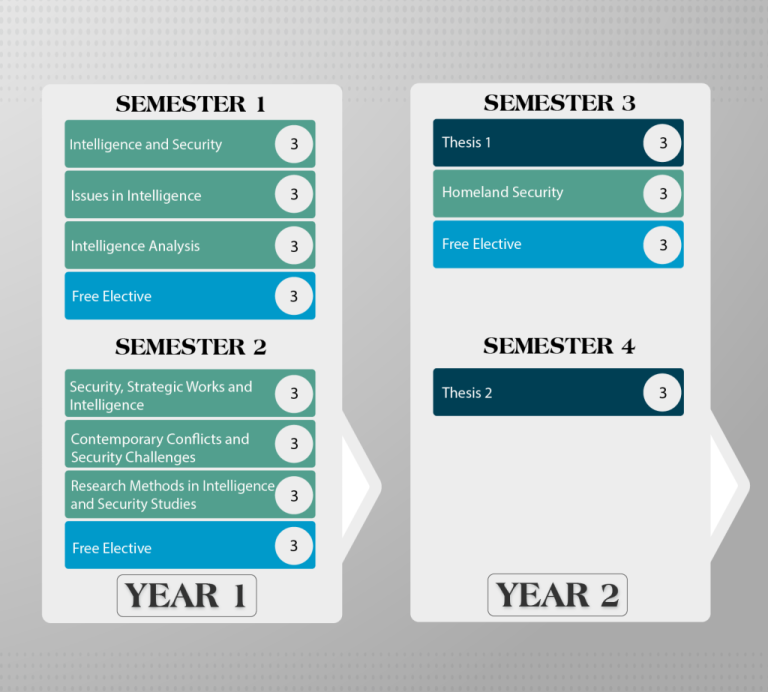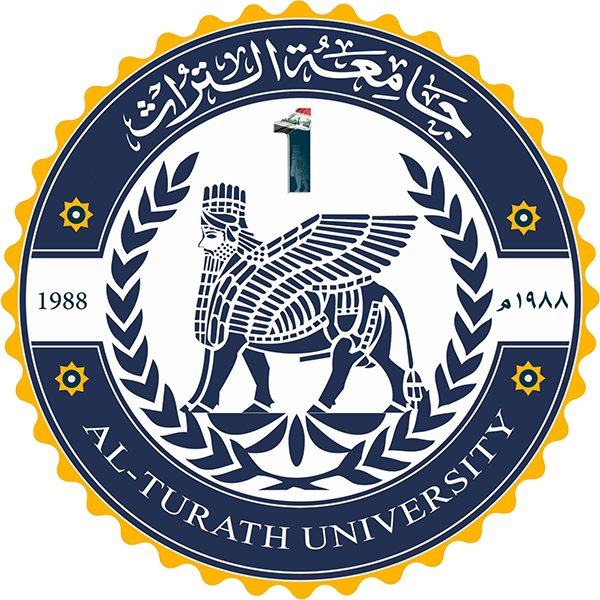Master in Security Studies and Information Analysis
- Overview
- Program Structure
- Accreditations
- Faculty
- Admission
-
Duration
2 Years
-
Classes
Weekday Morning Weekday Evening
-
Fees
Tuition (One Semester) ……… Approx. 40,000 AED
One academic year is two semesters
Admission (One Time) ……… 3,500 AED
About Program
The graduate program is an interdisciplinary, but specialized program, reaching out to practice, over theory. It analyzes and addresses current and emerging security and Intelligence challenges and opportunities.
The program prepares students, for a professional orientation in the Intelligence specialization and even more so in information analysis framework.
The program’s curriculum standards comply with the National Qualifications Framework of the UAE Level 9, Commission for Academic Accreditation (CAA) international accreditation standards, and International Association for Intelligence Education (IAFIE) education standards. The program is accredited by the UAE Ministry of Education.
Perspective students are provided with specialized knowledge spectrum in elements of Intelligence and information analysis regionally and globally. Students are keen in joining a framework of education that goes hand in hand with the security resilience policy of the UAE vision 2030, to meet the national and international educational standards; to offer knowledge capacity building and continuity through the world of security and global affairs.
The Master program, is designed for early and mid-career professionals; academically qualified graduates with B.A. or other higher degrees in the following fields but not limited to : International Relations, Political Science, International Studies, Security and Strategic Studies, Law, Humanities, Crisis Management, Criminology or a closely related or inter-related fields such as Communication, and Business, with specialization to security, strategy and international affairs, among others.
To apply for the Master’s program, students should meet all requirements of admission. All degrees should be in compliance with the Ministry of Higher Education and graduates applying should reflect recognized and accredited Universities by the UAE. International Degrees, should be attested first before applying.
Program Learning Outcomes
- Define and demonstrate the theory, history and contribution of the discipline of intelligence and security.
- Appraise collected data/information using a variety of analytic techniques and methodologies to produce original and advanced research in the Security and Intelligence field.
- Contextualize the principles of Security and Intelligence to evaluate intelligence and security threats.
- Apply critical thinking and innovative problem-solving skills for analyzing and reporting Security and Intelligence issues.
- Acquire the necessary skills to manage intelligence structures, functions, processes and practices in the UAE and GCC context.
Program Structure
Course Category
Core Courses
Elective Courses
Thesis 1
Thesis 2
Total (Excluding Bridging Courses)
Total Number of Courses
7
3
1
1
12
Total Number of Credit Hours
21
9
3
3
36 Credit Hours
- Core Courses
- Free Electives
- Thesis
The course aims to provide the students with an in-depth knowledge about the judiciary and arbitration, as well as introducing them to the nature of the relationship between the judiciary and arbitration and the difference between the judiciary as a general mean and arbitration as a parallel mean for settling disputes.
The course also helps the students understand the extent to which the arbitration depends on the judiciary in arbitration agreements, arbitration procedures, implementation of arbitral award, and formation of arbitral tribunal.
The course introduces the students to national and international agreements related to arbitration, including the Geneva Convention on the Execution of Foreign Arbitral Awards, the Washington Convention that led to the establishment of the International Centre for Settlement of Investment Disputes, the Oman Convention on International Commercial Arbitration and the Arab Convention on Commercial Arbitration.
Also, the students will learn about the most important arbitration centers that make decisions on various disputes and their rules, including the Washington Center for Settlement of Investment Disputes, International Chamber of Commerce, the Cairo Regional Centre for International Commercial Arbitration, the Dubai International Arbitration Centre, and the G.C.C Commercial Arbitration Centre
The course examines and analyzes the similarities and differences between intelligence and strategic intelligence. In this regard concepts and theories will be explained and analyzed such as the content of intelligence and the threats revealed by intelligence information. The most important aspects will be the assessment, evaluation, interpretation and extrapolation of the information gathered from different sources. In particular, the course focuses on strategic Intelligence will be related to the concept of tactical intelligence.
Students in this course will work with their thesis supervisor to develop a thesis proposal and begin their distinctive, applied research project. It is meant to stimulate students in acquiring and in-depth knowledge and insight in a specific subject of interest to the students which should contribute to the discipline areas of security and strategic studies. The primary goal is for the student to practice the mechanisms of transitioning from concept to active inquiry. Depending on the nature of the subject, the student will develop a study questions, conduct a literature review, develop a methodological approach, and begin preliminary research. Students are expected to apply qualitative, quantitative, and comparative research approaches to the chosen subject.
In this course, students will continue developing their thesis project, revising techniques (if required), addressing challenges, analysing findings, and eventually articulating the complete experience. Students will build on work from the previous semester and put all of the pieces together to complete the final thesis project, following the required research process and procedures. Students will be required to provide a verbal defense as part of the assessment and fulfilment of the course.
Recommended Study Plan

Accreditations
The American University in the Emirates is licensed by the UAE Ministry of Education – Commission for Academic Accreditation | caa.ae

Prof. Chahine A. Ghais
Professor / Dean

Prof. Dusko Tomic
Professor / Program Director - Security And Strategic Studies

Dr. Eldar Šaljić
Associate Professor / Program Director - Security Studies And Information Analysis

Dr. Mohamed El Yattioui
Assistant Professor / Program Director - Diplomacy
Graduation Requirements
For graduate degree completion, graduate students must satisfy the following requirements:
- Earn a minimum CGPA of 2.00 on a scale of 4.00.
- Successfully complete all courses as described in the study plan.
- The Degree Completion requirements must be met within the timeframe of the program.
- Successfully complete the “Thesis” course.
Joining the Program
- Fall Semester
-
September
-
Spring Semester
- January
- Summer Semester
- May







